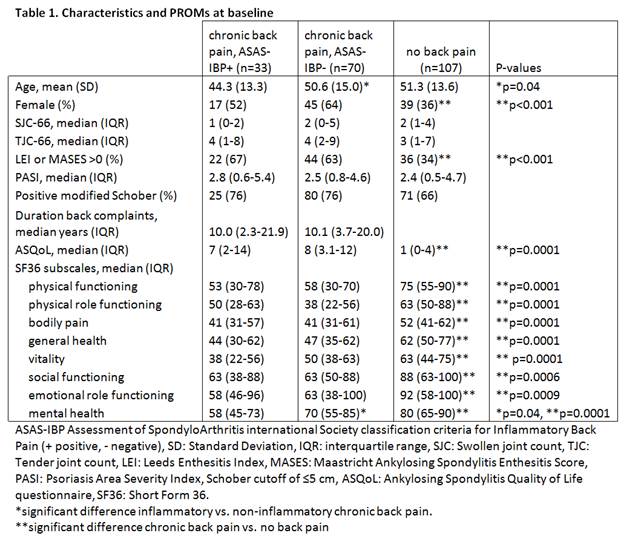Session Information
Session Type: ACR Poster Session B
Session Time: 9:00AM-11:00AM
Background/Purpose: Axial involvement is less well studied in peripheral spondyloarthritis where chronic back pain is not the predominant symptom, such as in psoriatic arthritis (PsA). Our aim is to describe occurrence of back complaints in newly diagnosed psoriatic arthritis patients and its impact on quality of life for those with chronic back pain (CBP) and inflammatory back pain (IBP).
Methods: Baseline data of incident PsA patients was used from the Dutch south-west Psoriatic Arthritis Registry (DEPAR) study between August 2013 to March 2016. Trained research nurses took a standardized history and physical examination. Presence of IBP was determined using the Assessment of Spondyloarthritis international Society (ASAS) criteria for IBP. Quality of life was assessed using the Ankylosing Spondylitis Quality of Life Questionnaire (ASQoL), and the Short-Form 36 (SF36) subscales.
Results: In total, 323 patients had a baseline assessment. Average age was 50.4 years (SD 13.7) and 50% were male. 212 patients reported having or having had back pain (65%). 103 patients (32%) reported having back pain for more than 3 months at present or in the past twelve months, which is significantly more than in the general population (21%, P<0.0001 (1)). 33 (10%) fulfilled the ASAS-IBP criteria. We compared patients without back pain (n=111) to CBP patients, and within CBP patients we compared the IBP subgroup (n=33) and the non-IBP subgroup (n=70). CBP patients were more often female (60% vs 41%, p<0.001), and had more often at least one tender enthesis on the LEI and/or MASES (64% vs 34%, p<0.001). Quality of life was significantly worse, as reflected in lower median ASQoL scores (6 and 5 vs. 2, p=0.0001) and lower SF36 subscores compared to patients without back pain. IBP patients had significantly worse scores only on the mental health subscale compared to non-IBP patients with CBP.
Conclusion: chronic back pain is common in psoriatic arthritis and occurs more often in female patients. It has a severe impact on quality of life as assessed by both disease-specific and generic questionnaires, while the difference between inflammatory and non-inflammatory back pain groups is less pronounced.
1. Picavet HS, Schouten JS. Musculoskeletal pain in the Netherlands: prevalences, consequences and risk groups, the DMC(3)-study. Pain. 2003;102(1-2):167-78.
To cite this abstract in AMA style:
Wervers K, Luime JJ, Tchetverikov I, Gerards AH, Kok MR, Appels CWY, van der Graaff WL, van Groenendael HLM, Korswagen LA, Veris J, Hazes JMW, Vis M. Chronic Back Pain in Early Psoriatic Arthritis [abstract]. Arthritis Rheumatol. 2016; 68 (suppl 10). https://acrabstracts.org/abstract/chronic-back-pain-in-early-psoriatic-arthritis/. Accessed .« Back to 2016 ACR/ARHP Annual Meeting
ACR Meeting Abstracts - https://acrabstracts.org/abstract/chronic-back-pain-in-early-psoriatic-arthritis/

